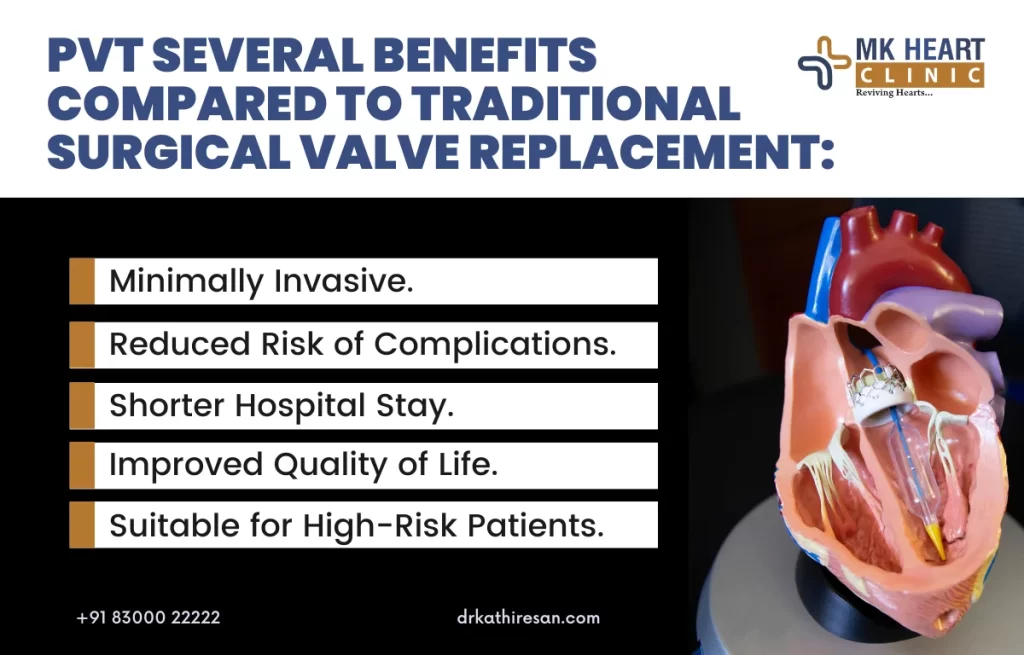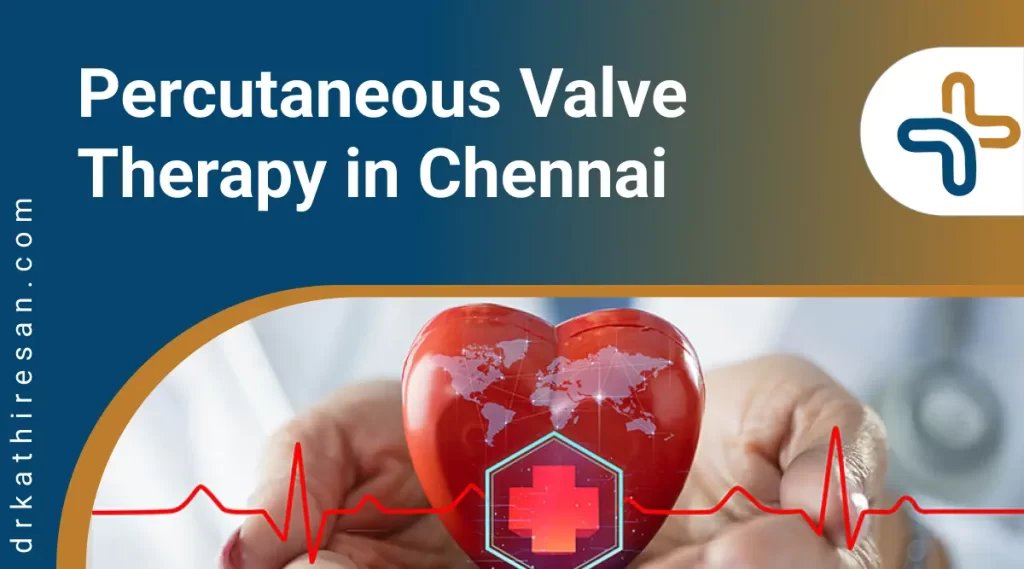The heart consists of four chambers namely two atria (upper chambers) and two ventricles (lower chambers). There is a valve that aids in the passing of blood before leaving each chamber of the heart. The four valves include the pulmonary valve, tricuspid valve, mitral valve, and aortic valve. These valves are actual flaps that are located on each end of the two ventricles where one inlet the blood and the other outlets the blood.
In rare cases, one or more valves fail to function to open and close properly, the heart effects can be serious, and possibly it hampers the heart’s ability to pump enough blood through the body. This is where percutaneous valve therapy in Chennai is performed depending on the diseased or damaged valve.
What is Heart Valve Disease?
Heart valve disease is where one or more of the valves in the heart doesn’t function properly. It can develop both stenosis (narrowing of the valve) and regurgitation (leakage of the valve) at the same time. Also, more than one heart valve may get affected at the same time. Heart valve problems can be one of the major causes of heart failure.
Conditions Treated in Percutaneous Valve Therapy
A patient will be required to undergo percutaneous valve therapy in Chennai when he/she has the following conditions that include:
- Aortic valve disease
- Aortic valve stenosis
- Aortic valve regurgitation
- Endocarditis
- Mitral valve disease
- Mitral valve stenosis
- Mitral valve prolapses
- Mitral valve regurgitation
- Heart valve disease
- Tricuspid valve disease
- Tricuspid valve stenosis
- Tricuspid valve regurgitation
What are the Symptoms of Heart Valve disease?
There are not many symptoms for mild to moderate heart valve disease. But some of the most common symptoms which would require a heart patient to undergo percutaneous valve therapy in Chennai include:
1. Palpitations
2. Chest pain
3. Fatigue
4. Shortness of breath
5. Dizziness
6. Low or high blood pressure
7. Abdominal pain
8. Swelling in the legs
9. Whooshing sound
10. Irregular heartbeat
If you experience any of the above mentioned symptoms, it is always important to check with a doctor for a diagnosis for a safer side in order to avoid risky complications in the future.
Why Percutaneous Valve Procedures are Performed?
When one of the heart valves is severely damaged or no longer works properly, it should be repaired or replaced. There are certain valve repair and replacement procedures that can be done without surgery. Usually, the percutaneous value therapy in Chennai is performed using a tube called a catheter.
During the percutaneous valve procedure, the catheter is inserted under the skin into a blood vessel which is known as percutaneous or endovascular access, and is guided through to the heart.
The heart valve procedures like valvuloplasty, are almost always done using a catheter. In most cases, percutaneous valve therapy in Chennai is performed as an alternative to established surgical options. This minimally invasive procedure is useful for treating patients who cannot undergo the surgical procedure, or who have had surgery that failed.
Also, it is beneficial for patients with serious heart valve diseases or those with other major coexisting conditions (comorbidities) precluding open surgery.
Is Percutaneous Surgery?
Percutaneous procedures are not considered traditional surgeries in the same sense as open-heart surgeries. Percutaneous interventions are minimally invasive procedures that are performed through small punctures or incisions in the skin, usually with the assistance of imaging technology such as fluoroscopy or ultrasound.
The term “percutaneous” refers to the method of accessing the target area without the need for large surgical incisions. Instead, interventional cardiologists or other specialists use catheters, wires, and other specialized tools for percutaneous valve therapy to navigate through blood vessels to reach the site of treatment.
While percutaneous procedures may not involve major incisions or require the opening of the chest cavity, they still carry out therapeutic interventions and are considered invasive. These procedures may involve the placement of stents, balloons, or other devices to treat blockages or abnormalities in blood vessels or other structures.
Compared to open-heart surgeries, percutaneous valve therapy typically has several advantages. They generally involve shorter hospital stays, quicker recovery times, less pain, and fewer complications. Patients who undergo percutaneous procedures often experience less scarring and have a reduced risk of infection.
It is important to note that while percutaneous procedures are not considered surgeries in the traditional sense, they are performed by highly trained interventional specialists who possess expertise in catheter-based techniques. These specialists, such as interventional cardiologists, use their skills and advanced medical devices to achieve therapeutic outcomes without the need for more invasive surgical approaches.
Percutaneous Valve Therapy – Options, Risks, and Benefits
Treatment Options
The treatment options of patients who are supposed to undergo percutaneous valve therapy in Chennai vary depending on the age, type of heart condition, and severity of the disease.
It is always better to consult with the cardiologist in the best heart hospital like MK Heart Clinic in Chennai as he will explain to you the treatment procedures and inform you which would suit the best based on your heart condition for a successful outcome.

Transcatheter Pulmonary Valve Replacement
The pulmonary valve lies between the lower right heart chamber (right ventricle) and the pulmonary artery. A diseased pulmonary valve interrupts blood flow from the heart to the lungs. Transcatheter pulmonary valve replacement is a treatment option for percutaneous valve therapy in Chennai because it can help improve blood flow and reduce symptoms of heart valve disease by treating a diseased or damaged pulmonary valve.
During the TPVR procedure, your cardiologist will insert a catheter in your groin into the femoral artery. It guides the pulmonary valve using advanced imaging techniques. Then a compressed heart valve is placed on the catheter and positioned inside the prosthetic pulmonary valve.
This percutaneous valve therapy in Chennai removes the catheter in the blood vessel and aids in expanding the valve to secure it in place and improves the symptoms related to pulmonary valve disease.
Transcatheter Tricuspid Valve Replacement
The tricuspid valve separates the upper right chamber, the upper (right atrium), and lower right heart chambers (right ventricle). A diseased or damaged tricuspid valve may interfere with the proper direction of blood flow. Transcatheter tricuspid valve replacement is a percutaneous valve therapy in Chennai that is performed as open-heart surgery or as a minimally invasive heart surgery to improve blood flow and reduce symptoms of heart valve disease.
During this percutaneous valve therapy in Chennai, a heart-lung bypass machine is used to keep your blood pumping through your entire body. The cardiac surgeon will make several incisions in your chest to repair and replace the tricuspid valve along with the other heart conditions. Then the bypass machine is removed and incisions are closed after ensuring that the heart function is proper.
Transcatheter Mitral Valve Replacement
The mitral valve is present between the left chambers of the heart namely the left atrium and left ventricle. Transcatheter mitral valve replacement is performed to fix or replace a leaky and stiff mitral valve. This specific percutaneous valve therapy in Chennai is done depending on the severity of the mitral valve disease and whether it’s getting worse.
During the TMVR procedure, your cardiologist will insert a catheter in your groin into the femoral artery. It uses advanced imaging with a catheter to guide the mitral valve. Then a compressed heart valve is placed on the catheter and positioned inside the mitral valve.
This percutaneous valve therapy in Chennai removes the catheter in the blood vessel and aids in expanding the valve to secure it in place and improves the symptoms related to mitral valve disease.
Transcatheter Aortic Valve Replacement
The aortic valve is located between the (left ventricle) left lower heart chamber and (the aorta) the body’s main artery. If the aortic valve doesn’t open correctly, the flow of blood from the heart to the body gets reduced. This is where the percutaneous valve therapy in Chennai, the transcatheter aortic valve replacement is performed to replace a thickened aortic valve that can’t fully open.
During this procedure, your cardiologist will insert a catheter in your groin into the femoral artery. It uses advanced imaging with a catheter to guide the aorta. Then a compressed biological heart valve is placed on the catheter positing it inside the diseased aortic valve. Then the catheter in the blood vessel is removed to expand the valve to secure it in place after this percutaneous valve therapy in Chennai.
Balloon Valvuloplasty
Balloon valvuloplasty is a medical procedure that is used to treat heart valve conditions. During this procedure, a catheter is inserted through a small incision in the groin and is guided to the heart using imaging techniques. A deflated balloon is attached to the end of the catheter, and once it reaches the narrowed heart valve, the balloon is inflated to widen the valve and improve blood flow.
This treatment option of percutaneous valve therapy in Chennai is typically used to treat stenosis, which is when a heart valve becomes stiff or narrowed, making it difficult for blood to flow through the heart. The procedure is minimally invasive, meaning that it does not require open-heart surgery and has a relatively low risk of complications.
After the surgical procedure, patients may need to take medications to prevent blood clots and reduce the risk of infection. Regular follow-up appointments with a cardiologist are also necessary to monitor the health of the heart valve and ensure optimal outcomes. It can provide significant relief to patients with heart valve conditions and improve their quality of life.
Risks and Benefits of Percutaneous Valve Therapy
Percutaneous valve therapy is a minimally invasive procedure used to repair or replace heart valves using catheters that are inserted through a small incision in the skin. The benefits and risks depend on various factors, such as the patient’s overall health, the severity of the valve disease, and the type of procedure performed.
Benefits:
- Minimally Invasive: Percutaneous valve therapy is a minimally invasive procedure, which means that it involves a smaller incision than traditional open-heart surgery. This results in less pain, scarring, and a shorter recovery time.
- Reduced Risk of Complications: Compared to traditional open-heart surgery, this procedure carries a lower risk of complications such as infection, bleeding, stroke, and arrhythmias.
- Quick Recovery: Because percutaneous valve therapy is minimally invasive, patients typically experience a shorter recovery time and can return to their normal activities sooner.
- Improved Quality of Life: Patients who undergo this procedure often report improved symptoms, such as shortness of breath, chest pain, and fatigue, which can greatly improve their quality of life.
Risks:
- Bleeding: Percutaneous valve therapy carries a risk of bleeding at the site where the catheter is inserted, as well as at other sites where the catheter is threaded through the body.
- Infection: As with any invasive procedure, there is a risk of infection, which can be severe and require hospitalization.
- Stroke: There is a small risk of stroke associated with this treatment procedure, particularly during the placement of the catheter.
- Valve Damage: There is a risk of damage to the valve during the percutaneous valve therapy, which may require additional treatment or surgery to correct.
- Procedural Failure: In some cases, this procedure may not be successful in correcting the valve problem, which may require additional treatment or surgery.
It is important for patients to discuss the procedure and their specific risks and benefits with their doctor to determine if percutaneous valve therapy is the best treatment option for them.
Percutaneous Repair of Heart Valves
During the percutaneous valve therapy, surgeons will insert a specially designed catheter into the blood vessel and guide it to the heart valve using advanced imaging techniques such as echocardiography and fluoroscopy. Once the catheter is in place, a replacement valve or a repair device will be placed inside the heart valve, effectively correcting the problem.
PRV has several advantages over traditional open-heart surgery. Firstly, it is a minimally invasive procedure, which means that it involves a smaller incision, less blood loss, and a shorter recovery time. Secondly, it is generally safer than open-heart surgery, as it reduces the risk of complications such as infection, bleeding, and stroke. Thirdly, PRV is suitable for patients who are not candidates for open-heart surgery due to their age or underlying health conditions.
However, percutaneous valve therapy is not without its risks. Some of the potential risks associated with PRV include bleeding, infection, stroke, heart attack, and valve malfunction. In addition, not all patients are suitable candidates for PRV, and the procedure may not be effective in all cases.
Conclusion
If you or anyone who is in need of percutaneous valve therapy in Chennai, you can approach MK Heart Clinic as this best heart clinic in Chennai has a highly experienced team of cardiovascular surgeons and interventional cardiologists who are specialized in performing these minimally invasive procedures with the most extensive catheterization facilities.
Read also: Best Foods for A Healthy Heart.



